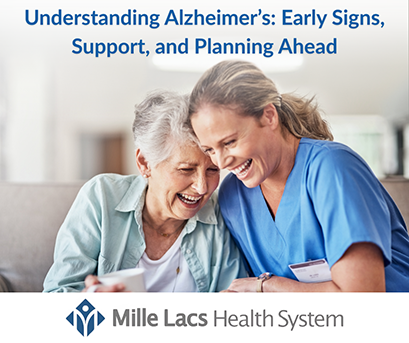Understanding Alzheimer's: Early Signs, Support, and Planning Ahead
December 1, 2025
November is Alzheimer’s Awareness Month, a time to highlight the importance of recognizing early signs and supporting individuals and families living with this disease. Alzheimer’s affects millions of people each year, and understanding the early symptoms can help families seek evaluation and plan ahead when changes first begin to appear.
Memory loss that disrupts daily life is often one of the earliest symptoms. Individuals may forget recently learned information, important dates, or rely increasingly on notes or reminders. Some may ask repeated questions or become confused by details that were once familiar. Difficulties with planning or problem-solving can also appear early, including trouble following a familiar recipe, managing bills, or maintaining focus on routine tasks.
As the disease progresses, familiar activities can become challenging. Driving to a well-known location, organizing a grocery list, or remembering the rules of a favorite game may lead to frustration. Disorientation with time or place is also common. A person may lose track of dates or seasons, forget where they are, or be unsure how they arrived somewhere.
Changes in visual perception can affect balance, reading, and depth judgment. New difficulties with words in speaking or writing may cause someone to pause mid-conversation or use incorrect names for common items. Misplacing items and being unable to retrace steps is another frequent concern, sometimes leading to misplaced accusations. Poor judgment may appear in unfamiliar spending habits or reduced attention to personal hygiene. Withdrawal from social activities, hobbies, or previously enjoyed routines can also occur. Many individuals experience changes in mood or personality, such as becoming suspicious, anxious, or easily upset.
Caregivers play a vital role in supporting individuals with Alzheimer’s disease. Simple communication strategies can help make daily interactions smoother. Using clear phrasing, offering one choice at a time, and allowing extra time for responses can reduce confusion. Asking, “Would you like the red shirt or the blue shirt today?” may be easier to process than an open-ended question. Paying attention to tone, facial expressions, and body language is equally important. If one approach is not effective, stepping back and trying again later can help. Caregivers should also protect their own well-being and seek assistance promptly if situations become unsafe or overwhelming.
Planning for the future is an essential part of supporting someone with Alzheimer’s. A health care directive outlines a person’s medical preferences and appoints a health care agent who can make decisions if the person becomes unable to communicate their wishes. It is especially important that the directive clearly states whether the designated agent can consent to mental health treatment. Without this language, families may face delays in receiving needed care and may need to pursue emergency guardianship through the court system. Including this information early can prevent unnecessary stress and ensure smoother access to care. It is also important to remember that a Financial Durable Power of Attorney does not allow someone to make health care decisions. Separate documents are required to ensure that medical wishes are honored. Minnesota’s official Health Care Directive form and instructions are available online for families who want to prepare in advance.
At Mille Lacs Health System, the Senior Care Unit supports patients and families at every stage of Alzheimer’s disease. Individuals admitted to the unit arrive with different levels of understanding about the condition, and the team works closely with families to explain treatment options, behavioral-management medications and their side effects, care placement decisions, and community resources. Staff often help families begin discussions about palliative care when appropriate, ensuring they feel informed and supported as they plan for the future. Through this compassionate and educational approach, MLHS strives to ensure that each patient and family feels empowered, respected, and guided throughout the Alzheimer’s journey.
For more information about Mille Lacs Health System Senior Care services or to reach the unit directly, call 320-532-2750.
